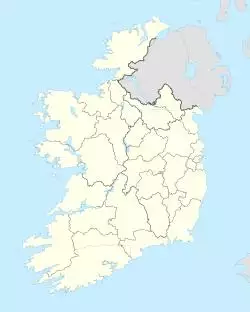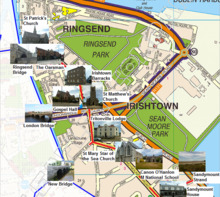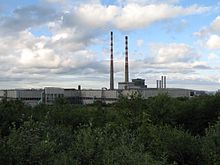Irishtown An Baile Gaelach | |
|---|---|
Suburb | |
.jpg) Irishtown Nature Park | |
| Coordinates: 53°20′16″N 6°13′21″W / 53.33778°N 6.22250°W | |
| Country | Ireland |
| Province | Leinster |
| County | Dublin city |
| Time zone | UTC+0 (WET) |
| • Summer (DST) | UTC-1 (IST (WEST)) |
| Eircode (Routing Key) | D04 |
| Area code(s) | 01 (+3531) |
| Irish Grid Reference | O190325 |
Irishtown (Irish: An Baile Gaelach) is an inner suburb of Dublin, Ireland. It is situated on the southside of the River Liffey, between Ringsend to the north and Sandymount to the south, and is to the east of the River Dodder.
History
Irishtown grew outside of Dublin, about 2 km west of the medieval city walls (see also Ringsend). Dublin was originally a Viking city and after 1171, when an Anglo-Norman army seized it, Dublin became the centre of English rule in Ireland. The native Gaelic Irish were therefore viewed as an alien force in the city, and suspicion of them was deepened by continual raids on Dublin and its environs by the O'Byrne and O'Toole clans from the nearby Wicklow Mountains. By the 15th century, Gaelic migration to the city had made the English authorities fearful that English language and culture would become a minority there. As a result, the Irish inhabitants of Dublin were expelled from the city proper in about 1454, in line with the Statutes of Kilkenny. The Irish population were only allowed to trade inside the city limits by daylight. At the end of the day's trading, they would leave and set up camp in what was to become known as "the Irishtown".
Later, Irishtown formed part of the Pembroke Urban District.
At the end of the 19th century and into the early 20th century, Irishtown was the location of the Waxies' Dargle, an annual outing by Dublin cobblers ("waxies"), which a well-known folk song recalls.[1]
Irishtown Nature Park
Irishtown Nature Park is a small park with a walkway which offers several kilometres of walking trails along the Poolbeg Peninsula.
See also
- History of Dublin
- List of towns and villages in Ireland
References
- ^ Brady, Eilish (1984). All in! All in!: A selection of Dublin children's traditional street-games. Dublin: Four Courts Press. ISBN 978-0-901120-85-4.


